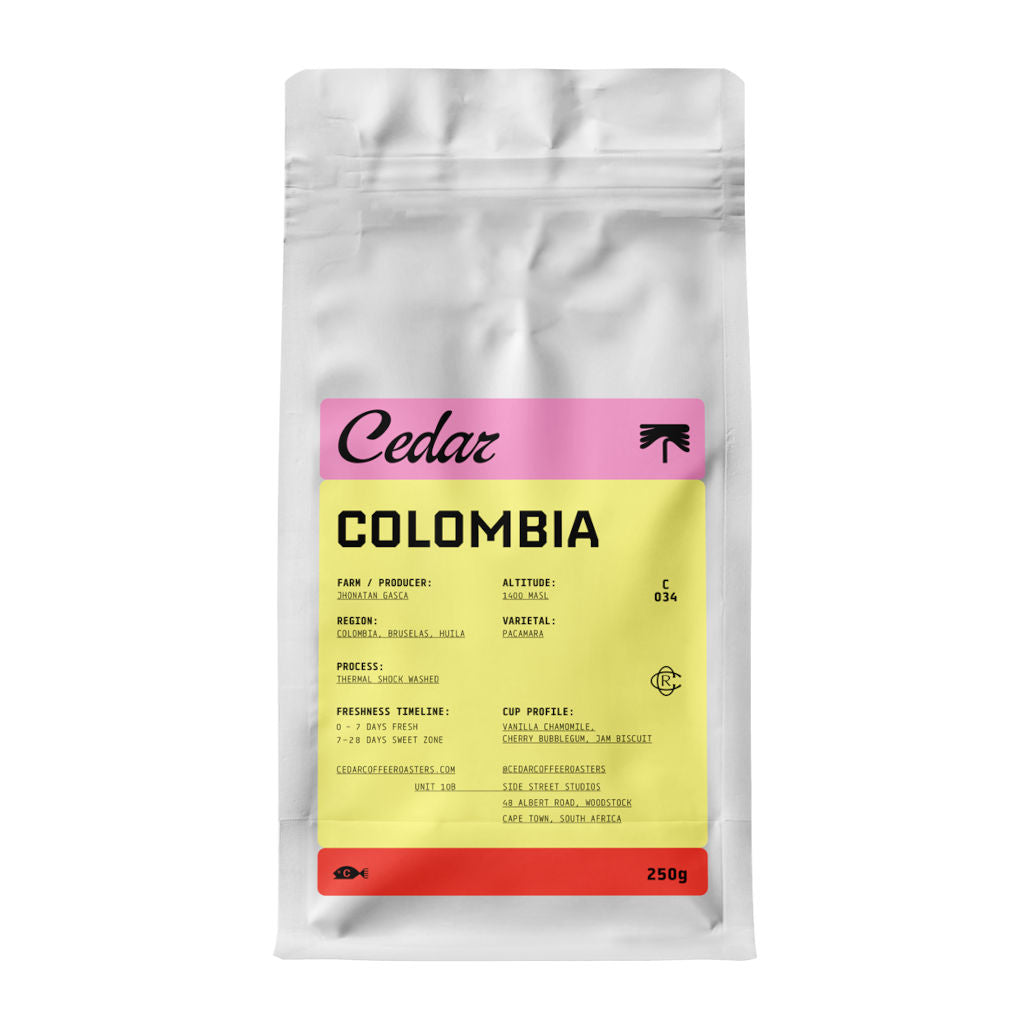
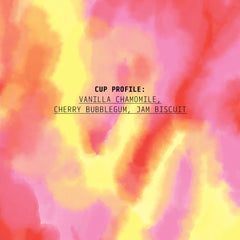
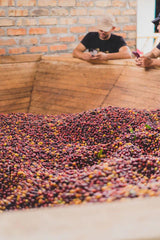
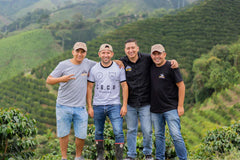
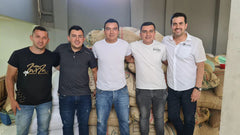
We receive fresh deliveries of these coffee beans twice per week. Please allow up to 3-4 working days after you order for dispatch in case we need to wait for the next delivery.
Now here’s something exciting: not only is this Cedar’s first Colombian release this year, but it comes from an up-and-coming new producer and has undergone a truly innovative and exciting method of processing: thermal shock. In short, thermal shock processing involves subjecting coffee (typically premium-quality coffee with high flavour potential) to intense temperature fluctuation during processing. Using a variety of tools and techniques, like liquid nitrogen and hot/cold-washing, this coffee is “shocked” with temperatures from -80°C all the way up to 60°, over the course of a relatively rapid but carefully controlled procedure. This can dramatically affect the eventual profile of a coffee, enhancing body, flavour and aroma in unique and complex ways.
In recent years, advanced processing methods have become quite popular in the Colombian coffee industry, and Colombian coffee producers have gained notoriety for successfully leveraging experimental new techniques to produce some incredibly unique coffees. That said, coffees like this one still don’t come around too often in South Africa, so we encourage you to grab some while you can if you want to experience the complex and unique flavours brought out by thermal shock processing.
Phaedon’s tasting notes
At the time of release of this coffee at CCB, I had only had one brush with it, still an unlabelled release from my friends at Cedar, at the time. It was in fact at Cedar's recent pop-up event. There was a bit of a rumble about the new unnamed coffee at the pour-over station, as well as a bit of intrigue about its origin.
Having a whiff of the beans recently ground by Leigh, I asserted my strong belief that it was a Kenyan coffee (it's Kenyan season after all); there were clearly those dark berry notes that one expects from Kenyan coffees. My assertion was thoroughly undermined by my first sip, much to my chagrin. I was looking for tart, winey acidity. Instead, I found something much more discrete.
I also was confronted by a flavour I wasn't expecting: unmistakably berry-flavoured bubble gum. Now I was confused. Having been humbled as a taster, I managed to elicit a charitable revelation from Leigh. It was actually a Colombian... a Colombian Pacamara. I would not have guessed that.
I'm looking forward to trying out this coffee in different brew methods, having now received my sample bag, but I can already offer an unhesitating recommendation to try it. It's quite different, and quite delicious.
Cedar’s notes
“What we found in the cup was a burst of refined flavours. An aroma and initial taste of vanilla and chamomile on the filter gets amplified to notes of cherry bubblegum through espresso. This espresso combined with milk gives us a taste reminiscent of strawberry whirls jam biscuits. “
- Cup profile: Vanilla chamomile, cherry bubblegum, jam biscuit
Coffee details from Cedar
“This is our first Colombian release for 2024 and we wanted it to be something special and unique, so we ventured beyond our familiar producers and placed our trust in our Colombian partner and good friends Sabores. They presented us with a new producer making waves in the industry and barista competitions: Jonathan Gasca and his Zarza farm.
“Zarza Coffee is associated with the family name "Gasca" and relates to the Zarzamora, an interweaving bush taken to symbolise strength and family unity. The journey for Jonathan was challenging and early attempts at experimenting with fermentation processes failed which resulted in his being turned away by many coffee buyers. In 2018 he was encouraged by friends from El Divisio and Las Flores to give it another shot, and since then Jho has quickly become a leader in processing innovation in his home country.
“Let's talk about Thermal Shock. This innovative process essentially consists of rapid heating of the liquid, i.e. juices in the reactor, and subsequently violently cooling of grains.
“Coffee first goes through a floatation process where ripe cherries are sorted. Then it goes through a 24-hour oxidation process at an average room temp of 25 degrees celsius. It is then placed in sealed containers for 60 hours at an average temp of 16 - 18 degrees celsius.
“The coffee is then pulped and goes through the Thermal Shock process, water at 60°C is added, and then water at 12°C. This process slows down the fermentation process in a cooler temperature preserving the sweetness from the extra sugars without the risk of spoilage. The coffee is then washed and dried in canopies or machines at a maximum temperature of 30°C to 36°C for about 8 to 12 days to reach 11% humidity levels.”
- Farm/Producer: Jonathan Gasca
- Region: Bruselas, Huila
- Country: Colombia
- Process: Thermal shock washed
- Altitude: 1400 masl
- Variety: Pacamara
